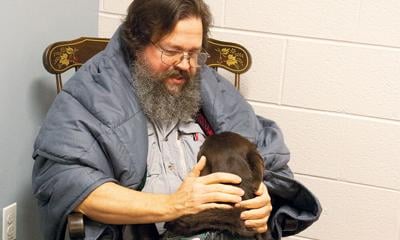This professor wants you to know it’s not
By Robin Earl
Ramon Selove, 54, was glad to provide input for an article about college-age students with autism.
“During Autism Awareness Month, all of the articles are about young kids. The thing about autism is, we grow up.”
Selove, who is autistic, has been an associate professor of anatomy and physiology at the Middletown campus of Lord Fairfax Community College for 30 years. He said he takes issue with the infantilization of people with autism; research on autism, for instance, mostly focuses on children. “Parents tell me that I’m the first adult they’ve ever met with autism.”
He said that people seem to think autism fades in adulthood. That kind of thinking, he said, “negates the struggle. It takes a lot of work to be social when you are autistic – and to maintain it. It’s a lot of effort, and it can be exhausting.”
The Sensory Break Room
Selove recognized that sometimes students with autism need a safe place to escape from sensory overload. He pushed for years for such a room. Finally, in 2018, the Sensory Break Room was established on the Middletown campus. When Selove meets a student he thinks might benefit from the room, he gives them a card with the room number and the security code.
The Sensory Break Room features a rocking chair and a beanbag chair, weighted blankets and a dimmer on the light switch. The professor demonstrated, “I like to put the weighted blanket over my shoulders. Feeling the weight is comforting. And rocking chairs are good for me.” There’s also a box in the room filled with small objects that offer auditory, visual or physical stimulation. “They provide a coping strategy for controlling hypersensitivity,” said Selove.
Selove also said that as autistics age and gain experience, “they can learn to recognize when a meltdown is coming, and sometimes they can delay it.” He said that just knowing there’s a safe place to go can allow students to forestall it completely. The Sensory Break Room is their safe place on campus.
The B.O.N.D. Club
Several students who are members of the school’s B.O.N.D. Club (an acronym for Bureau Of Neuro-Diversity) expressed appreciation for the Sensory Break Room. Devon, who is studying for a career in healthcare, said, “it’s definitely been helpful to me.”
Selove said that the club “comes from the desire to bring together people with differing neurotypes like autism, ADHD, PTSD, dyslexia, epilepsy, OCD, anxiety disorder, etc. It also reinforces that our goal is social support — helping us bond with each other.”
At a recent gathering, the group discussed the challenges of being neuro-diverse in a neurotypical world, and how some people they meet are surprised to hear they’re autistic.
John said people tell him, “You don’t look autistic.”
Daniel laughed, “What does an autistic look like, anyway?” He added, “They say, ‘you talk and make eye contact so well.’ They don’t realize I’ve worked at it.”
“I’m not good with small talk,” said Anya, a general studies student. “I find it kind of fun to work on a group project though, because I wouldn’t talk with other people if I didn’t need to.”
Devon talked about taking a leadership role during group projects. “I often find myself in that position and it’s not comfortable. I’m not set up to be a leader. I just want to do my job and be left alone.”
At the B.O.N.D. Club, the students appear to feel accepted and understood in a way they may not elsewhere. They know that Selove has been where they are, and that helps.
“Some autistics think college is unattainable,” Selove said. “I want them to know that it’s not.”


(0) comments
Welcome to the discussion.
Log In
Keep it Clean. Please avoid obscene, vulgar, lewd, racist or sexually-oriented language.
PLEASE TURN OFF YOUR CAPS LOCK.
Don't Threaten. Threats of harming another person will not be tolerated.
Be Truthful. Don't knowingly lie about anyone or anything.
Be Nice. No racism, sexism or any sort of -ism that is degrading to another person.
Be Proactive. Use the 'Report' link on each comment to let us know of abusive posts.
Share with Us. We'd love to hear eyewitness accounts, the history behind an article.